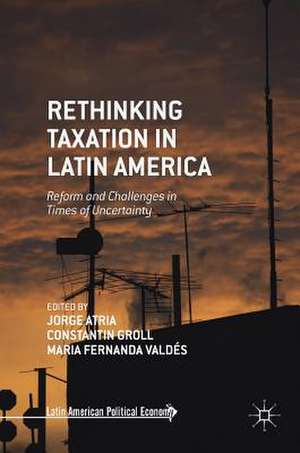Rethinking Taxation in Latin America: Reform and Challenges in Times of Uncertainty: Latin American Political Economy
Editat de Jorge Atria, Constantin Groll, Maria Fernanda Valdésen Limba Engleză Hardback – 29 dec 2017
| Toate formatele și edițiile | Preț | Express |
|---|---|---|
| Paperback (1) | 579.97 lei 38-44 zile | |
| Springer International Publishing – 5 sep 2018 | 579.97 lei 38-44 zile | |
| Hardback (1) | 647.59 lei 6-8 săpt. | |
| Springer International Publishing – 29 dec 2017 | 647.59 lei 6-8 săpt. |
Preț: 647.59 lei
Preț vechi: 761.87 lei
-15% Nou
Puncte Express: 971
Preț estimativ în valută:
123.92€ • 129.71$ • 103.14£
123.92€ • 129.71$ • 103.14£
Carte tipărită la comandă
Livrare economică 31 martie-14 aprilie
Preluare comenzi: 021 569.72.76
Specificații
ISBN-13: 9783319601182
ISBN-10: 3319601180
Pagini: 271
Ilustrații: XVII, 269 p. 9 illus., 5 illus. in color.
Dimensiuni: 148 x 210 mm
Greutate: 0.62 kg
Ediția:1st ed. 2018
Editura: Springer International Publishing
Colecția Palgrave Macmillan
Seria Latin American Political Economy
Locul publicării:Cham, Switzerland
ISBN-10: 3319601180
Pagini: 271
Ilustrații: XVII, 269 p. 9 illus., 5 illus. in color.
Dimensiuni: 148 x 210 mm
Greutate: 0.62 kg
Ediția:1st ed. 2018
Editura: Springer International Publishing
Colecția Palgrave Macmillan
Seria Latin American Political Economy
Locul publicării:Cham, Switzerland
Cuprins
1. Introduction: Taxation in Times of Uncertainty in Latin America .- 2. Debtor Coalitions and Weak Tax Institutions in Latin America: Insights from Argentina and Brazil .- 3. State Capacity and Development: Federalism and Tax in Brazil .- 4. Global Uncertainty in the Evolution of Latin American Income Taxes .- 5. International Insertion, Volatility and Fiscal Resources in Countries Specialized in Extractive Industries: Between A Rock and A Hard Place? .- 6. Gender Bias of Regressive Taxation in Latin America: Overview and Exploration of the Argentinean Case .- 7. Business Groups, Tax Efficiency, and Regressivity in Colombia .- 8. Tax Incentives in Latin America: The Case of Guatemala .- 9. Latin American Taxation from A New Perspective: Contributions from the Relational, Historical and Transnational Dimensions.
Notă biografică
Jorge Atria is Researcher at Pontificia Universidad Católica de Chile and Adjunct Researcher at Centre for Social Conflict and Cohesion Studies (COES), Chile.
Constantin Groll is Researcher at Freie Universität Berlin, Germany.
Textul de pe ultima copertă
Jorge Atria is Researcher at Pontificia Universidad Católica de Chile and Adjunct Researcher at Centre for Social Conflict and Cohesion Studies (COES), Chile.
Constantin Groll is Researcher at Freie Universität Berlin, Germany.
Maria Fernanda Valdés is a program coordinator for the Friedrich Ebert Stiftung in Bogotá, Colombia.
Caracteristici
Proposes a new approach to the study of tax system dynamics in Latin America, taking historical, transnational, and relational (state-society) features into account Provides diverse empirical case studies that explain the causes and origins of challenges in tax systems in Latin America in the current times of uncertainty Explains why tax systems in Latin America remain weak, regressive, and deficient when it comes to providing public revenue to enhance development and social justice














